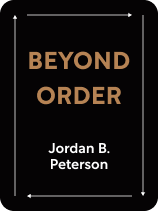

This article is an excerpt from the Shortform book guide to "Beyond Order" by Jordan Peterson. Shortform has the world's best summaries and analyses of books you should be reading.
Like this article? Sign up for a free trial here.
What does Jordan Peterson think you should do with one room in your house? What’s his advice for dealing with bad memories? What things should you refuse to do?
In Beyond Order: 12 More Rules for Life, Jordan B. Peterson lays out his philosophy and rules for living a life of excellence in a world of hardship and chaos. Peterson offers 12 rules, centered on ideas of chaos, change, and order.
Continue reading for an overview of this much-anticipated sequel.
Overview of Beyond Order: 12 More Rules for Life
Beyond Order: 12 More Rules for Life covers how and why to listen to your conscience, how to find the courage to take responsibility for yourself and your loved ones, and how to show up for life as fully as you can.
Peterson is a Canadian clinical psychologist and emeritus professor at the University of Toronto, as well as a former associate professor at Harvard. He rose to fame in 2016 for his controversial critique of identity politics and Canada’s Bill C-16, which extended discrimination, hate speech, and hate crime protections to gender-diverse individuals. Peterson is also known for his Youtube-based lecture series on mythology, religion, and psychology, as well as for staunchly supporting free speech, monogamous marriage, and the importance of the Bible to Western culture.
Beyond Order builds on the ideas laid out in 12 Rules for Life, Peterson’s 2018 self-help best seller. We’ll present his 12 additional rules in three groups:
- Group #1: Rules for Personal Responsibility—why and how to act in your own best interest, commit to a focused path, and become all that you can
- Group #2: Rules for Dealing With the World—why and how to relate effectively to your spouse/partner, your workplace, and the world at large
- Group #3: Rules for Existential Well-Being—understanding the structure of reality, accepting that life is full of darkness, and finding courage and gratitude regardless
(Shortform note: Though Peterson began his academic career as a clinical psychologist and Harvard associate professor, he has since become a prominent figure in what’s been called the culture war. Due to his stances on topics such as identity politics, political correctness, freedom of speech, and Marxism in the university system, Peterson is commonly associated with the conservative right. Critics have accused him of perpetuating harmful ideas and supporting the alt-right (a far-right, generally white nationalist movement that emerged in US politics in the mid-2010s), while supporters praise him for speaking up for ideas that go against the grain of mainstream thinking. Since Peterson is a complicated figure, we’ve focused on the substance of his writing rather than his controversies or his public life.)
Group #1: Rules for Personal Responsibility
To begin, we’ll explain Peterson’s four rules that concern personal responsibility, or how you can take control of your life as an individual. We’ll discuss his views on finding meaning in life, how to focus and commit to things, how to act properly, and how to learn from your past. Taken together, these rules convey Peterson’s ideas about how to conduct yourself as a responsible, ethical, and mature member of society.
Rule #4: Notice That Opportunity Lurks Where Responsibility Has Been Abdicated
We’ll first discuss Peterson’s Rule #4, in which he contends that assuming personal responsibility for your life will bring you meaning and fulfillment.
Peterson argues that meaning in life doesn’t come from happiness, as is commonly believed. That’s because happiness only feels good for a moment or two—and having previously felt good doesn’t help much when life gets tough. In the midst of a dark, difficult experience, that earlier happiness will be just a memory.
Instead, Peterson says, you can find lasting strength and meaning in a life of responsibility. Taking responsibility for your life will make you strong, committed, and capable—traits that help you find meaning and fulfillment. Think of taking responsibility as an exercise: The more you practice being responsible, the stronger you’ll become.
Expanding Your Responsibilities
Once you can handle the weight of your work, relationships, and daily life, Peterson recommends that you take on additional responsibilities. Many people, he says, leave important tasks unattended (at work and at home) or do them poorly. If you take on these missed opportunities, you’ll grow even stronger while also improving your reputation and gaining opportunities to advance in life and work.
You can find the work that needs doing by listening to your conscience. Your conscience is the voice within you that speaks up when you do something bad versus something good. According to Peterson, you can rely on it as an unerring judge of the quality of your actions—of whether you’ve acted in accord with your highest good. Thus, your conscience is an inner instinct for ethical behavior.
Rule #7: Work as Hard as You Possibly Can on at Least One Thing and See What Happens
While following your conscience may work wonders, doing so is no use if you aren’t consistent. Consistency, Peterson argues, is a necessary precondition of success. You won’t get anywhere if you don’t commit to something and stick to that path.
To become consistent, pick a direction and stay the course single-mindedly. As you go, you’ll need to confront the trials and challenges of that path. According to Peterson, these challenges will test your commitment and show you what you’re made of. When you give yourself no options but to follow through, that pressure will make you strong enough to handle anything.
In fact, Peterson explains, limitations create freedom. There isn’t enough time to become everything you might want to be. But if you don’t choose any path, you won’t become anything at all. By instead committing to a path at the expense of all others, you guarantee that you’ll become something.
Rule #9: If Old Memories Still Upset You, Write Them Down Carefully and Completely
As you grow by committing and following through, you might face obstacles along your path in the form of painful memories of past experiences. These experiences, Peterson argues, linger within us and hinder our growth—but consciously processing those painful emotions has a cathartic effect that catalyzes further growth.
As Peterson explains, difficult or traumatic memories are important sources of feedback that we ought to learn from, but too often leave unprocessed. We learn from negative feedback—burn your hand, learn not to touch hot stoves. And, if a memory sticks around, that means your brain has deemed it important enough to learn from. However, when it comes to complex, emotional memories (rather than simple feedback like physical pain) we often lack the tools or skills to process them and instead end up overthinking, worrying, and avoiding them.
In Peterson’s view, you can effectively process old emotional wounds by revisiting them and working through them in writing. Specifically, Peterson advises that you face up to the pain of such a memory and reinterpret it from an adult perspective. To do this, look for ways to reframe the memory rationally, and try to add nuance to the way you understood it when it happened. By doing this, you’ll make sense of what happened, what went wrong, and why. Knowing that, you can derive a lesson from the memory and move past the pain.
To process your memory, try to reason through it with adult rationality. By reframing and thinking through the situation rationally, you can defuse painful emotions, learn from what really happened, and grow beyond those past emotional wounds.
Rule #2: Imagine Who You Could Be, and Then Aim Single-Mindedly at That
In choosing to take responsibility, stay committed, and work through your painful past, you’ll still need to know what direction is most worth heading in. In Rule #2, Peterson addresses how to determine what’s worth doing and how to become everything you can. Further, he asserts that because our world is full of suffering, we’re each obligated to become the best people that we can be. By doing so, we can help reduce suffering and bring some light to the world.
Becoming all that you can be is possible because, according to Peterson, we live in a reality of boundless potential—the raw material of existence from which we can shape our lives. But given this boundless potential, how can we possibly know how to act? Peterson suggests looking to the great stories of the past and imitating the heroes of our myths.
Today, we’ve inherited the great stories that cultures have developed and passed down since the ancient past. Peterson says that humanity has distilled the essential patterns of right or effective conduct into our myths and narratives—that is, the ways in which mythological characters act demonstrate the archetypes of conduct that we view as “right” and “wrong.” Think of the “hero” versus the “villain”—you can pick each out from a story based on how they behave.
Primarily, Peterson recommends that you learn from the hero’s journey. This is the archetypal journey of the “chosen one” who is called away from home to face a great challenge, overcome the darkness within and without him or herself, and return victorious. For instance, think of the prince who leaves home to slay the dragon and rescue the maiden, or the Jedi who overcomes darkness to save the galaxy.
Peterson contends that the myth of the hero’s journey derives from early acts of human courage. Ancient hunter-gatherers had to leave the safety of the tribe and fire, go out into the night, overcome unknown dangers, and return with valuable resources such as food and water. This basic act of courage was necessary for our survival.
Given this, Peterson recommends that you imitate these acts of courage. Draw inspiration from our ancestors, take heart, and face up to the darkness in your life. Today, our challenges are more abstract than giant snakes—still, we need to confront, overcome them, and grow stronger through those encounters. Peterson contends that in doing so, you’ll transform yourself into a modern-day hero, becoming wiser, more mature, and more competent.
To find the proper heroic motivation, Peterson suggests the following tactics:
- Pursue a noble and challenging goal.
- Embrace the inevitability of failure.
- Be willing to fundamentally transform yourself.
Group #2: Rules for Dealing With the World
In this next section, we’ll discuss five rules for conducting yourself in the social world. Specifically, we’ll explore Peterson’s perspectives on tradition and change, romantic relationships, chronic stress and your home life, ideological dogma in the world around us, and work situations that compromise your values. By following these rules, you’ll reduce the friction and difficulties in your interactions with other people and the world at large.
Rule #1: Do Not Carelessly Denigrate Social Institutions or Creative Achievement
Starting with a discussion of the world at large, Peterson argues in Rule #1 that we should respect our traditional social institutions while also embracing the reality of achievement and change. These are complementary forces: Traditions ground us and connect us to the past, while creative thought challenges and renews facets of society that have stagnated.
According to Peterson, our traditional social institutions are solutions to complex problems that humanity has spent millennia working on: How we can best structure our societies, organize large-scale actions such as building cities, live together in a civilized, non-violent way, and so on. Though at times they may seem anachronistic, they serve to keep human civilization in good order.
At the same time, all traditions are prone to becoming dogma—rigidly following old ideas even when they’ve become outdated. In time, Peterson says, dogma falls away when creative thinkers challenge the flaws in an existing status quo and improve upon them. In this way, creative change counteracts the eventual decline of traditional ideas and ways of living.
Peterson argues that, since these forces—tradition and change, conservatism and liberalism—work together to keep society balanced and moving forward, we should respect both of them. If one is missing, we risk falling to either extreme:
- At one extreme, conservatism becomes stagnant and corrupt—unable to handle a changing world.
- At the other extreme, liberalism can lead to totalitarian ideologies that crucify offenders.
According to Peterson, today’s conservative dogmas were once new, and today’s ideas will one day become conservative dogma. In the end, both matter.
Rule #5: Do Not Do What You Hate
While tradition and creative achievement both matter, you’ll sometimes come up against ideas that you just can’t agree with. In Rule #5, Peterson discusses how to handle these ideological conflicts when they start to compromise your sense of what’s right and wrong.
In life and work, you’ll sometimes find yourself in positions that compromise or challenge your morals. If you accept these situations, Peterson says, you’ll become passive and, over time, suffer from repressed emotions. Specifically, you’ll experience inner emotional conflict and struggle to respect yourself. That is, since you failed to stand up for what you thought was right, you won’t be able to see yourself as morally upright or respectable.
To avoid this fate, equip yourself to combat policies or impositions with which you take great issue. Peterson recommends two strategies:
- Improve your skills. Prepare to pivot your career in a new direction if needed or desired.
- Educate yourself. Get to know both sides of the issue, and develop your own argument.
If you take up the fight and it goes poorly, these strategies will have you prepared to pivot and stay employed. If it goes well, you’ll have honored your inner moral instinct and grown as a person.
Rule #6: Abandon Ideology
If workplace ideologies or stances continue to conflict with your morals, you might find more help in Peterson’s next rule, where he suggests avoiding ideology altogether. In Rule #6, Peterson explains that Western civilization was once founded on traditional Judeo-Christian values and that these values told us our history, culture, conventions, and how to live together civilly. However, modern science and rationalism have diminished belief in God and removed those foundations.
According to Peterson, the loss of our traditional values left a moral void that scientific materialism has failed to fill. And while modern materialism hasn’t produced a better system of values, people still need guidance as to what’s meaningful, how the world works, and what we ought to do with our lives.
To fill this need, Peterson says, along came the major ideologies of the 20th century. Peterson explains that ideologies are simplistic accounts of how the world works and of what’s right versus wrong. In essence, an ideology 1) declares the cause of all suffering, 2) claims to have the solution, and 3) offers the moral high ground to people who join the tribe.
However, Peterson says, ideologies misrepresent the complexity of the real world. Major problems like human suffering and inequality have complex and historically contingent causes that we can’t easily uncover, and ideologues intentionally obscure this complexity. If you fall for simplistic answers given with righteous conviction, Peterson argues, you risk becoming arrogant and susceptible to manipulation. Specifically, feeling like you have the indisputable moral high ground allows you to condemn those who disagree with you and become resentful of people who think differently.
To avoid this problem, reject dogma and choose to grapple with the true complexity of the world. Educate yourself, reading and learning across ideological boundaries. Figure out your own life before you try to tell other people how to live. Over time, you’ll develop your own thinking and become able to deal with larger and more complex problems in the real world.
Rule #10: Plan and Work Diligently to Maintain the Romance in Your Relationship
Moving away from the broader world and into the home, Peterson asserts in Rule #10 that monogamous marriage is the best way to structure your adult social life. He argues that as of yet, human societies haven’t devised a better basic social unit than married pairs. With a spouse and family, you have a support system that will always be there for you in our often cold, harsh world.
Peterson asserts that, once you’re married, you should work hard to make your marriage successful. To ensure you can do this, he recommends making two commitments:
- Take divorce off the table.
- Communicate openly and consistently.
Once you’ve committed to making your marriage work, turn to the logistics of daily life. In conversation with your spouse, hash out all the details about how you’ll live your life together. Peterson says that, since traditional gender roles hold less sway than before, you’ll need to plan your and your spouse’s roles in detail. This involves how you’ll keep your house, run finances, whether to have children and how to raise them, your work and career choices, who washes the dishes, and so on.
Since what you do routinely constitutes most of your life, it’s important to get your routines right. Once you’ve sorted out the details, regularly check in with your spouse about how they’re doing and whether they need changes. Consistent communication ensures that you avoid tyrannizing each other.
With your practical matters squared away, Peterson recommends that you plan your romantic life. While scheduling romance sounds unsexy, it ensures that your love life doesn’t fall by the wayside. Plan regular date nights, such as dinner at your favorite local restaurant or a walk in the park, and use these times to be fully present with your spouse. Making these efforts will help you remember why you first fell in love, and they’ll sustain your romance over time.
Rule #3: Do Not Hide Unwanted Things in the Fog
Continuing his advice for creating an orderly home life, Peterson argues in Rule #3 that you shouldn’t ignore chronic stressors, lest they become larger issues. Daily life is full of tiny, repeating pricks of stress—kids to care for, work colleagues to deal with, imperfect relationships to manage, and chores to juggle. If you let these pricks build up, they’ll amount to tons of stress over time.
As Peterson explains, a little thing that happens every day isn’t actually small, because most of your life is made of those routine occurrences. So if your routines regularly prick you with little stressors, that irritation will build up until it bursts.
To solve this problem, Petersons recommends that you do the following:
- Acknowledge your chronic stressors.
- Find ways to deal with them.
Since these little stressors often involve relationships, Peterson emphasizes that you must get clear about how you feel and communicate that to whomever’s involved.
First, acknowledge this stressor and get clear about why it bothers you. Then, find a way to fix it—this could be as simple as speaking to your partner and asking for the change you need. By doing this with each of your previously ignored stressors, you’ll clear up emotions that would otherwise fester beneath the surface. You’ll get to know how you really feel on a daily basis, and you’ll often change your daily life for the better. According to Peterson, the alternative is to accept death by a thousand cuts—daily misery from suppressed emotions that will trouble you and your loved ones unendingly.
Group #3: Rules for Existential Well-Being
In Group #3, we’ll discuss Peterson’s perspective on how to relate to the world at large. These three rules deal with questions of a more existential nature. Specifically, we’ll explain how to stay connected to a higher good, how to avoid growing bitter as life challenges you, and how to find strength and thankfulness in the face of life’s inevitable hardships.
Rule #8: Try to Make One Room in Your Home as Beautiful as Possible
Peterson asserts in Rule #8 that beauty plays a vital role in life: It connects us to the sense of wonder and mystery that we felt as children. Without making room for beauty, we can lose touch with the mystery of life and the wonder all around us.
As children, we have no problem connecting to beauty. We see the world through fresh eyes, and we can feel wonder everywhere. But, with time, Peterson says, we lose this ability to perceive the wondrousness of the world. Instead, we fall into ruts and routines, and we start to take for granted the beauty that still exists all around us. It becomes mundane, drab, and familiar.
There is a way back to that child-like perception, however. Peterson argues that fine art can reconnect us with the beauty we saw as children. Great artists retain their child-like connection to wonder and can translate that unclouded perception into art. In other words, they capture what others can no longer see and render it visible to the rest of us. So. if you regularly engage with great art, you can find glimpses of that beauty and wonder.
According to Peterson, this is why we’re so captivated by great art even though we often don’t consciously understand it: It reveals to us a depth of beauty that we could not previously perceive. So, make room for beauty in your life by getting at least one work of art that truly calls to you. By regularly reconnecting with beauty through that artwork, you’ll stay afloat despite the stresses and struggles of life.
Rule #11: Do Not Allow Yourself to Become Resentful, Deceitful, or Arrogant
In Rule #11, Peterson argues that we must all avoid slipping into immoral behavior due to frustration with life. If, instead, you choose courage and listen to your conscience, you’ll grow strong and able to navigate the trials of life. In contrast, acting immorally will lead you astray and distort your sense of right and wrong.
To explain his position, Peterson contends that chaos and evil are intrinsic parts of reality—therefore, we’ll all encounter difficulty, misfortune, and suffering in life. And given that life is difficult and often unfair, it’s all too easy to start cheating or cutting corners to get ahead. But though these immoral behaviors may yield short-term advantages, Peterson says that they’ll distort your sense of what is right, good, and true. Over time, you can even change the structure of your brain such that you lose the ability to act morally in any situation.
Instead of acting immorally when you get frustrated, accept that reality features both great good and evil. Since you can’t escape either, choose to cultivate gratitude and courage. Thinking that you’ll escape suffering is arrogant, whereas accepting the bad and giving thanks for the good is realistic and keeps you afloat. Gratitude and courage prevent you from feeling victimized by the world, and they give you the strength to take responsibility and face up to the challenges in your life.
Rule #12: Be Grateful in Spite of Your Suffering
Continuing from Rule #11, Peterson explains that it’s all too easy to become bitter and dissatisfied with life. Darkness and suffering are unavoidable, and many people end up unhappy with themselves and with life in general. However, falling into despair does you no good and can cause you to act out the darkness within you. This, in turn, will worsen your life and the lives of those around you.
The alternative, Peterson argues, is to choose gratitude in the face of the great darkness and suffering of life. This doesn’t mean denying that life is full of suffering. Rather, it means acknowledging the darkness and finding gratitude despite it. Even when life seems bleak, you can look around and focus on what you do have. Thinking like this gives you the strength to go on even during hard times.

———End of Preview———
Like what you just read? Read the rest of the world's best book summary and analysis of Jordan Peterson's "Beyond Order" at Shortform.
Here's what you'll find in our full Beyond Order summary:
- A no-nonsense guide to navigating the chaos of our difficult world
- How and why you should listen to your conscience
- How to show up for life as fully as you can






